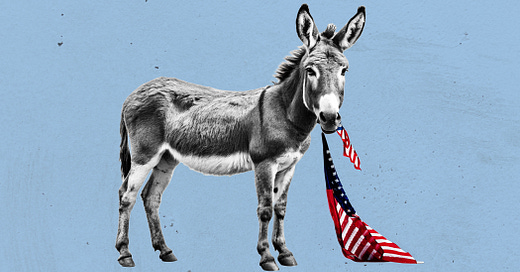The Democratic Party Will Decide If Biden Steps Aside
And the fact that the GOP has no influence on Trump's candidacy is evidence that the Republican party is a failed institution.
1. The Party Decides
At some point in the next two weeks, President Biden will almost certainly announce that he is no longer running for reelection.1
Why?
For a bunch of reasons, but primarily because the Democratic party is a strong institution and it is signaling that it does not want him to remain its nominee.2
One of the hallmarks of healthy institutions is that the bigger and more consequential a decision is, the more diffuse the decision-making process becomes. Let’s use an analogy from baseball.
At the least-important level, an individual player is the sole-decider: The pitcher chooses what pitch he throws to a batter. No one else weighs in.3
But consider a more important decision: Naming the starter in the first game of a playoff series. The coach makes that decision, but he does so with input from his assistants and guidance from the stat department.
Now consider what happens when a team has the number one overall draft pick? This is a much larger choice that will impact the entire franchise for years. Who makes that call?
If you go by org chart, this pick is the responsibility of the general manager (or president of baseball operations). But in reality, a number-one overall pick is too important for just one guy to make it. The GM will want the coach’s buy-in. He’ll need inputs from the data team in the front office and the scouts. He’ll talk to the owner of the club to make sure he’s onboard. And the GM will also need to take the temperature of the fan base and make certain that the player he wants to draft wouldn’t antagonize them in some obvious way.4
So yes: The GM makes the pick. But he has to do so in concert with other power centers and stakeholders, who have effective veto power.
The same is true in a healthy political party.
Who decides whether or not Joe Biden is the Democratic party’s nominee? Technically, it’s the people who voted in the Democratic primaries. But the reality is complicated.
Like the general manager, Biden is the one who ultimately makes the decision on whether or not to remain the nominee. But like the GM, Biden has to take into account other stakeholders and power centers.
For instance: It matters what other elected Democrats think. If a mass of congressional Democrats believe that Biden is endangering their races and want Biden to step aside, that is important. If Democratic governors believe that Biden cannot win their state, that’s a problem.
It also matters what party elders think. If Nancy Pelosi and Hillary Clinton and Barack Obama believe that Biden’s candidacy hurts the party, they can exert an enormous amount of pressure on him to step aside.
It matters what donors think. If fundraising becomes a slog, the ability to raise money is a consideration.5
And finally, it matters both what Democratic voters and independent voters think. If polling shows that significant percentages of them want Biden to reconsider his candidacy, that’s important input. You shouldn’t draft a #1 pick if your season ticket holders don’t want to watch him play.
All of which is why when President Biden says that he absolutely will not give up the nomination, it is not the final word. Sure, it’s his decision. But it’s not entirely his decision.
To have any congressional Democrats calling for their party’s nominee to withdraw four months from the election is extraordinary. We already have several of them. This week, with Congress back in session, that number will grow.
We know that at least some of the party elders—especially Nancy Pelosi and James Clyburn—are publicly open to Biden withdrawing. Again: This is extraordinary.
We don’t know about the money yet. But we do know that a significant percentage of voters want Biden to step aside. You can see this in general election polling, where Biden is now below 40 percent in the 538 average.6 You can also see it in swing-state polling which shows vulnerabilities in previously safe states . And you can see it most clearly in surveys where somewhere between a third and half of Democrats say Biden should relinquish the nomination.7
This is not a tenable position.
So yes, Biden says he will not withdraw. But every campaign says that until the minute it schedules the press conference to announce that the candidate is dropping out.8
To my eyes, the Democratic party has already rendered its decision and the institution is now in the process of helping Biden reconcile himself to it.
2. Failed Institutions
What we are seeing in the Democratic party might look like chaos or weakness, but is a sign of health and strength. To understand why, consider the Republican party.





